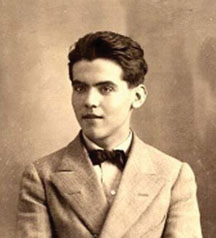A little known early play (1919), perhaps his first, by Federico Garcia Lorca, the brilliant and enigmatic Spanish author, caught the imagination of Composer Frank DiGiacomo. Luckily, two short arias were actually written down and performed, however, the music for the rest of the piece was never finished. The play is a sensitive and delicate love story set in a village of insects, at the side of a lovely meadow.
The poet Boybeetle is loved by his mother, Doña Beetle, who limps, having lost a leg being sweeped out of her former home by a unknowing human, kindly advised by Witchbeetle, the village doctor and wise woman, and Sylvia Beetle, hopelessly in love wiith Boybeetle. She expresses her love, “I thrill with delight at his lovely body and his eyes dreamy as a poet’s. I love him unto madness.”
Boybeetle’s former affections for Sylvia have been superseded by his new love for a splendid scarlet poppy. In the course of the action, a Butterfly who has fallen and broken her wing, is carried in by the concerned villagers. Boybeetle is full of disquiet as he soon falls in love with the wounded visitor. He is caught in the “evil” spell of conflicting loves.
Lorca’s fame, outspoken views and the dangerous political atmosphere of the Spanish Revolution brought him to an early brutal death. His writings, moved from place to place by his friends to avoid their being confiscated and destroyed, resulted in the final pages of the play being lost. However, individuals who actually saw the 1920 premiere in Madrid report that the Boybeetle’s dreamy loves finally cause his death.
Frank DiGiacomo completed the story in his own libretto for Lorca’s bittersweet little playlet. As Boybeetle finally passionately embraces the recovered Butterfly, she mounts into the air, and as she flies higher, the Boybeetle falls to his death in the meadow. He is carried back by the members of the stricken insect village, led by the mourning Sylvia, Doña Beetle and the Witchbeetle.
The Butterfly’s Evil Spell
The Boybeetle’s Song high voice
The Boybeetle’s Lament high voice

Federico Garcia Lorca 1914